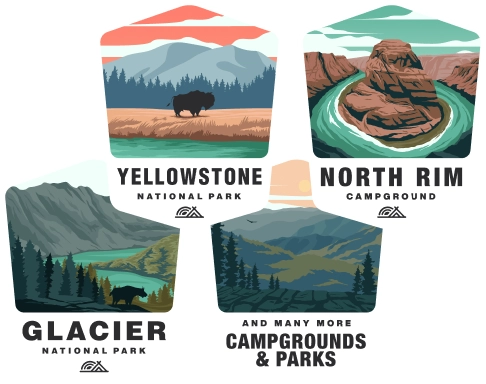Camping at White River National Forest
Overview
White River National Forest is a national forest located in the state of Colorado. It's the most visited national forest in the United States due to its vast array of recreational activities and its proximity to Colorado's high population centers. The forest covers more than 2.3 million acres, including iconic mountains like the Maroon Bells and several ski resorts such as Aspen, Vail, and Breckenridge.
Camping Options
Developed Campgrounds: There are numerous developed campgrounds that offer amenities like picnic tables, fire rings, potable water, and restrooms. These campsites often require reservations, which can be made through Recreation.gov well in advance of your trip, especially during peak seasons.
Dispersed Camping: For a more remote experience, White River National Forest offers dispersed camping options outside of designated campgrounds. This means you can camp anywhere on Forest Service land as long as it's at least 100 feet from water sources and trails, and adheres to Leave No Trace principles.
Permits and Fees
Most developed campgrounds require a fee to help maintain the facilities. For dispersed camping, there is typically no fee, but certain areas may have special regulations or require free permits to preserve the natural habitat.
Respect Wilderness Areas
White River National Forest includes several wilderness areas such as the Holy Cross, Eagles Nest, and the Maroon Bells-Snowmass. These areas have strict regulations to maintain their pristine condition. Motorized vehicles and bicycles are not allowed, and group sizes are often limited.
Fire Restrictions and Safety
Always check for current fire restrictions before going camping, as they change based on conditions and season. When fires are permitted, use established fire rings and ensure all fires are completely extinguished before leaving.
Wildlife Precautions
Bears are active in White River National Forest, so it's essential to practice bear safety. This includes using bear-proof containers for food storage, keeping a clean campsite, and disposing of waste properly.
Weather Considerations
Mountain weather can be unpredictable and change rapidly. Even in summer, temperatures can plummet, and snow is a possibility at high elevations. Always be prepared with appropriate gear for a variety of weather conditions.
Leave No Trace
It's crucial to follow Leave No Trace principles to minimize your impact on the environment. This includes packing out all trash, being considerate of other visitors, and leaving natural and cultural resources as you find them.
Planning and Preparation
Before setting out, ensure you have all the necessary maps, supplies, and information. Check the White River National Forest website for the latest updates on trail conditions, closures, and regulations. Always inform someone of your itinerary and expected return time.
By adhering to the rules and regulations and being prepared for your adventure, camping in White River National Forest can be an enjoyable and memorable experience. Always prioritize safety and environmental stewardship to help preserve the beauty and accessibility of this public land for future generations.

